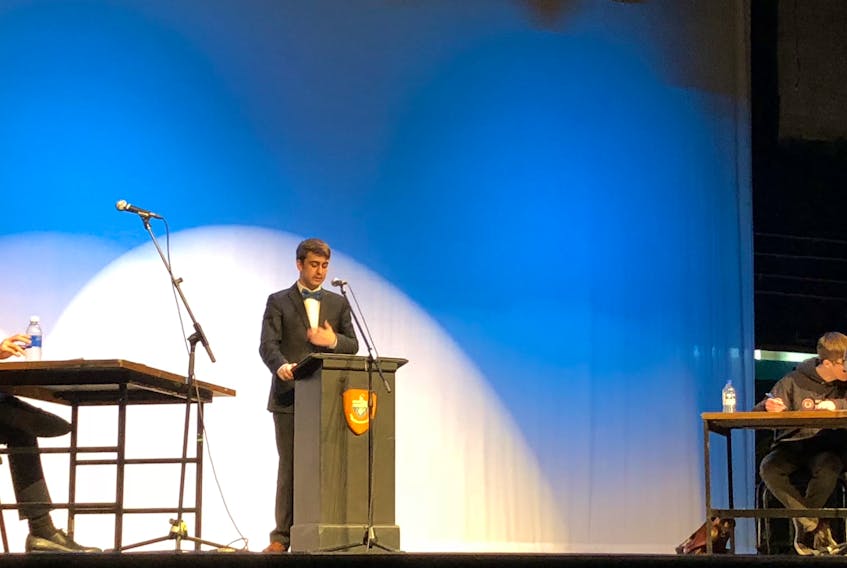About 150 of some of Canada’s brightest high school students gathered at Holy Heart Theatre over the weekend for the Canadian National Debating Championships, the first time the tournament’s been hosted in this province in 14 years.
Competitors are selected by their provincial associations, usually at provincial championships, to represent their province at the national level.
The championship round Sunday afternoon came down to a team from Halifax Grammar School in Nova Scotia and University of Toronto Schools in Ontario, with Ontario students Alykhan Jetha and Jonathan Liu taking home the championship for their province.
Competitors in the final round debated the use of preemptory challenges in the jury selection for criminal trials. Preemptory challenges permit lawyers to reject a certain number of potential jurors without giving a reason. Challenges can be used by prosecutors to dismiss jurors unlikely to convict, for example.
“The debate can boil down to one point very often, and the team that sees that and points it out effectively is the team that wins the debate,” said John Robinson, arguably the most senior judge at the tournament.
One team from Newfoundland and Labrador, who debated in French, was eliminated in the semi-finals. Debating the motion, “This house would leave medical decisions affecting a child to a doctor, not a parent,” Holy Heart of Mary High School students John Harris and Henry La Prairie had only 30 minutes to prepare their arguments after hearing the topic, and could use only one source of information — their brains.
Motions at the weekend tournament had a Canadian focus, or were timely international topics of interest to Canadians. This level of debating requires hours of practice each week in preparation, and students follow the news closely so that they can speak confidently on any number of topics.
During a semi-final round debating the prohibition of political donations except from individuals, debaters spoke urgently and waved their arms in front of the podium.
The action and suspense at a debating championship can rival any sporting event.
Teams consisted of two students, and while one debater stated their case to the captivated audience of mostly high school students, the other three debaters on stage could be seen furiously scribbling notes in preparation for their arguments and rebuttals.
Robinson, who also teaches debating and public speaking to Manitoba high school students – where it is a required course – said this national tournament is the high point for most students’ debating careers.
“One of the great things about debating is that it’s one of the most important skills students can learn,” he said.
“Most of your interaction with the world is actually spoken rather than written, and so being able to speak effectively is incredibly important. Being able to listen effectively and understand what the other person is actually saying is incredibly important. And being able to think logically and critically, and understand arguments, is useful in all aspects of life. Debating is the activity that combines all of those.”
Robinson said he hopes this event will promote debating in this province, to get more people involved, and perhaps even put more importance on it in the school curricula.
“The students I’ve seen from Newfoundland are very eloquent, and it would be great if this could help promote things in Newfoundland,” he said.
The national tournament may be over, but students now have an opportunity to try out for Team Canada today (Monday). The team consists of three to five students, and each province is permitted to nominate three students to try out to represent the country at the annual World Schools Debating Championships.
Twitter: juanitamercer_









